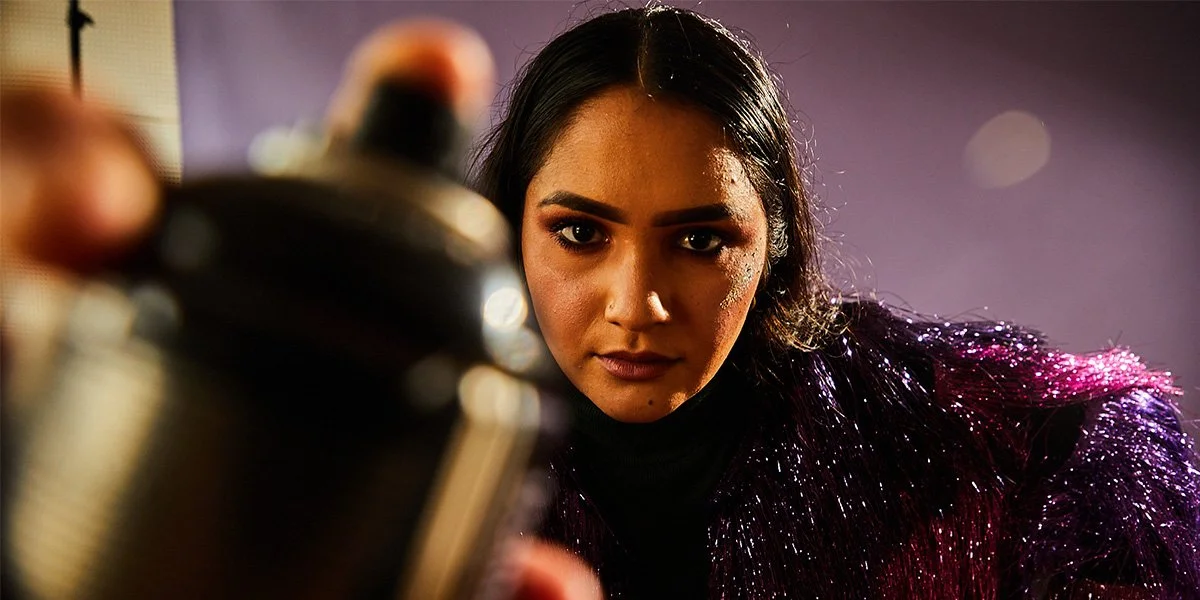Theatre: “Love Letters To The Revolution” is a charming, unapologetic, and wildly entertaining rage against the machine
Seeing “Love Letters To The Revolution” feels like falling into an expertly crafted trap.
It doesn’t seem like much at first. As you find your seat in the Blue Room Theatre, the only thing you see on stage is a makeshift stoop. No extravagant set design, no props, no bells and whistles that would give you a hint of what’s to come; just a slab of elevated concrete with some steps. Rule #1 of trap-setting: lull your prey (audience, same thing) into a false sense of security.
When it comes to the bait, writer/director Sian Murphy lures in the audience in phases, first with Stephanie Sommerville (one of the play’s 5-person cast) who steps onto the stage, and begins to regale a gripping tale in a magnetic performance that quietly draws your attention. As the monologue builds, so does the energy in the room. The lights flicker. The colours seep in. The mood shifts. Layer by layer, the production comes to life, and by the time you realise the reason behind your thumping heart is the anxiety-inducing synth of Em Burrows’ (Web Rumors) score, it’s too late. The trap door has closed behind you. In the next 70 minutes, there is nowhere else you would rather be than the delightful, confronting, and utterly transfixing party that is Love Letters to the Revolution.
The story of Love Letters is told through a series of vignettes, snapshots of modern day Australians navigating their way through friendships, drunken night outs, interpersonal conflicts, the patriarchy, sexual assault, and awkward social situations in a series of conversations the characters have with one another.
Anchored by committed performances by its ensemble cast, the play unfolds in an almost stream-of-consciousness way that whips us through pivotal moments of connection and confrontation between its characters: two strangers share chewing gum with one another and open up about their relationships with men in an unexpected way; two activists skewer each other about how they fight for their respective causes in the middle of a protest; a soon-to-be maid of honour reassures the soon-to-be bride during a booze-filled hen’s night; a young man summons the courage to approach a woman at a party. It is a testament to Murphy’s sure-footed writing that the Love Letters is able to cycle the audience through many of these seemingly unconnected scenes without leaving us feeling whiplash or confusion about what’s going on. This is further bolstered by how gracefully the play’s agile performers transition from one character into another, all while effortlessly walking the tightrope between comedy and drama (shout out to James McMillan, who is perfectly skeevy in a menacing, completely dialogue-free role).
It also helps that Love Letters also has a secret weapon up its sleeve, in the form of its delicious score. Composed and produced by local Perth musician Em Burrows, the music almost functions as the pulsating, beating heart of the story, playing a crucial role in the play’s wonderful magic trick of “filling in the blanks” and immersing the audience into the reality of its characters. Of course, the play cleverly takes advantage of Burrows’ particular brand of infectious electronic pop to breathe life into the party scenes and elevate the sometimes tongue-in-cheek instances throughout the play, but the score particularly shines during the Love Letters’ tense moments, when the tempo slows down, and the synth makes you feel like you’re about to sweat with anxiety.
So what is this play trying to say with these Coffee-and-Cigarettes style sampling of conversations? You’re going to have your own take as the trap door finally swings open, and you are released back into a world that suddenly does not seem too different than the one you were just in. But thanks to its laser-focused writing, captivating performances, and a transportive score, Love Letters to the Revolution says it with unflinching defiance, creativity, and style.
4.5 out of 5 stars
cover photo by Duncan Wright






